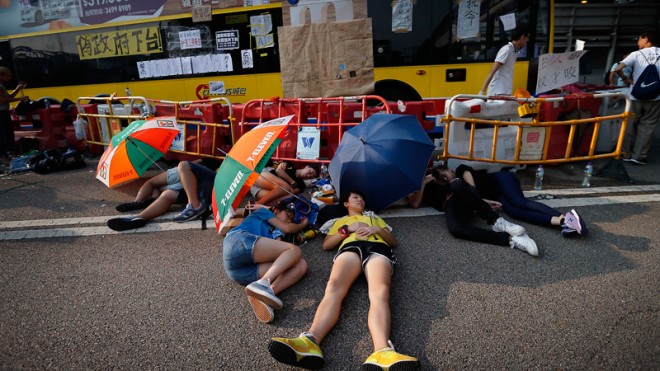No images of Hong Kong protests in China’s media

Student activists sleep in the shade of umbrellas, on a road near the government headquarters where pro-democracy activists have gathered and made camp, Tuesday, Sept. 30, 2014, in Hong Kong. Ubiquitous images in Hong Kong media with masses of unarmed students fending off pepper spray with umbrellas could not contrast more starkly with mainland China’s virtual blackout of news about the territory’s pro-democracy protests. (AP Photo/Wong Maye-E)
BEIJING — China’s government has cut off news about Hong Kong’s pro-democracy protests to the rest of the country, a clampdown so thorough that no image of the rallies has appeared in state-controlled media, and at least one man has been detained for reposting accounts of the events.
By contrast, media in semiautonomous Hong Kong have been broadcasting nonstop about the crowds, showing unarmed students fending off tear gas and pepper spray with umbrellas as they call for more representative democracy in the former British colony.
The contrast highlights the differences in the “one country, two systems” arrangement that China’s Communist Party agreed to when it negotiated the 1997 return of Hong Kong. It also reflects Beijing’s extreme sensitivity about any possible sparks of pro-democracy protest spreading to the mainland.
“The authorities see this as a matter of life and death,” said Shanghai-based columnist and independent analyst Zhao Chu. “They don’t see it as a local affair but a fuse that can take down their world.”
In Hong Kong, broadcasters NOW and Cable TV have carried wall-to-wall coverage of the unfolding events, including student leaders storming government headquarters Friday and the running clashes with police over the weekend. Hong Kong’s pro-democracy newspaper, the popular Apple Daily, has run its own live Internet feed that features aerial images of the crowds captured by a drone.
Beijing clearly has not been pleased with the unfettered coverage and has appeared to lump the Hong Kong media outlets in with foreign ones.
“Several Western media are making a big fuss, and some even have done live casts,” said an editorial on the party-run news site of the People’s Daily.
While Hong Kong enjoys civil liberties unheard of on the mainland under the “one country, two systems” arrangement, the situation is vastly different in Beijing’s official media, through which the authorities can largely control the narrative on any outbreaks of unrest in the mainland.
The coverage of the Hong Kong protests has been confined in mainland China to TV anchors reading brief statements with no video and text reports with no photos. The reports have mostly mentioned illegal gatherings in Hong Kong and the efforts of authorities to disperse them.
The Hong Kong-based China Media Project counted only nine articles in Chinese newspapers Tuesday about the protests, six of them stemming from a news release by the official Xinhua News Agency saying the protests had hurt Hong Kong’s economy and misquoting a high-profile university administrator as saying students should disperse.
The other three pieces appeared in the nationalistic newspaper Global Times, which called the gatherings illegal, disruptive of social order and harmful to the economy.
Censorship of microblogs — including phrases such as “tear gas” — has kept online discussion muted. The image-sharing Instagram service was shut down in China over the weekend.
“The clampdown has been most thorough, covering all media — traditional or new, central or local, governmental or market-oriented,” Zhao said.
Some images from Hong Kong’s streets have seeped into the mainland via cellphone messaging services. Many users have converted words into images to avoid having searchable text that can be easily caught by censors. Still, users are complaining of posts being deleted, including in private chats with friends.
Activist Wang Long in the southern city of Shenzhen, who reposted news about the protests on the instant messaging service WeChat, was detained Monday by police on suspicion of causing trouble, his lawyer friend Fan Biaowen said.
The controls have been largely effective.
“The majority of the Chinese public does not know what’s going on in Hong Kong. Only a handful know,” said Beijing-based journalism professor Zhan Jiang.
While Hong Kong is outside China’s “Great Fire Wall” that blocks mainland access to many foreign Internet news and social sites, authorities could conceivably shut down the Internet there — as they have done in the country’s restive ethnic regions — because of their control of telecommunications companies.
For now, that seems unlikely because the move would dent Hong Kong’s image as an open financial center.
Nevertheless, rumors of that possibility have fueled a rush to download Firechat, a messaging service that can send and receive messages without an Internet connection. Instead, the handsets can message each other in a daisy-chain fashion that creates a cloud-like network.
Beijing is on edge because it fears the social movement in Hong Kong and its appeal for democracy could galvanize members of the Chinese public, said Zhao, the analyst from Shanghai.
“It must be tightly controlled so it will not infect the mainland,” he said.